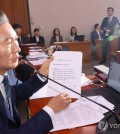- California Assembly OKs highest minimum wage in nation
- S. Korea unveils first graphic cigarette warnings
- US joins with South Korea, Japan in bid to deter North Korea
- LPGA golfer Chun In-gee finally back in action
- S. Korea won’t be top seed in final World Cup qualification round
- US men’s soccer misses 2nd straight Olympics
- US back on track in qualifying with 4-0 win over Guatemala
- High-intensity workout injuries spawn cottage industry
- CDC expands range of Zika mosquitoes into parts of Northeast
- Who knew? ‘The Walking Dead’ is helping families connect
U.S. has not seen possibility of N.K. provocations in martial law aftermath: Austin
The United States has not seen any possibility yet of North Korea seeking to undertake provocations in the aftermath of President Yoon Suk Yeol’s botched martial law attempt, Defense Secretary Lloyd Austin said Monday, reaffirming the alliance between Seoul and Washington remains “ironclad.”
Austin made the remarks amid lingering concerns that Pyongyang could take advantage of political turmoil in South Korea to engage in provocative acts and that the aftermath of the short-lived martial law declaration could have an impact on security coordination between the two allies.
“We certainly have not seen that (possibility) yet, and we remain focused on any change to the status quo,” Austin told reporters in response to a question from Yonhap News Agency, aboard the USS George Washington nuclear-powered aircraft carrier at Yokosuka Naval Base near Tokyo.
He brushed aside concerns that political uncertainty in Seoul could get in the way of the allies’ security cooperation.
“I will begin by saying that our relationship with the ROK is ironclad and I expect that it will continue to be,” the secretary said, referring to South Korea by its official name, the Republic of Korea.
“My staff at the assistant secretary level, my senior military officer in theater, the chairman of the Joint Chiefs … all continues to engage with their (Korean) counterparts to ensure that we maintain open lines of communication and stay focused on a task at hand.”
The secretary voiced confidence that South Korea will continue to work through “its political domestic challenges.”
“I won’t comment on (Korea’s domestic process) one way or the other,” he said. “I would just say that you know our relationship is ironclad, and we remain focused on the defense of the peninsula.”
Before the press meeting, Austin met with service members of the aircraft carrier, underlining their “critical” role in sending a message against China’s growing maritime assertiveness.
“You know that this theater has been described as our pacing challenge … because the PRC is the only country in the world that has the intent and increasingly the capability to change the rules-based international order,” Austin said. PRC stands for China’s official name, the People’s Republic of China.
“We want to see this region and this area remain open to freedom of navigation and the ability to fly the skies and international airways whenever we want to.”
USS George Washington is the only permanently forward-deployed U.S. aircraft carrier worldwide. Its air wing has an F-35C squadron, which a senior defense official called a “significant milestone” for U.S. presence in the Indo-Pacific.
Austin is in Japan on his 13th and last visit to the Indo-Pacific in his capacity as the Pentagon chief.
His Asia swing was expected to include a stop in South Korea, but the Korea portion of the trip was excluded in the aftermath of Yoon’s short-lived martial law imposition.











